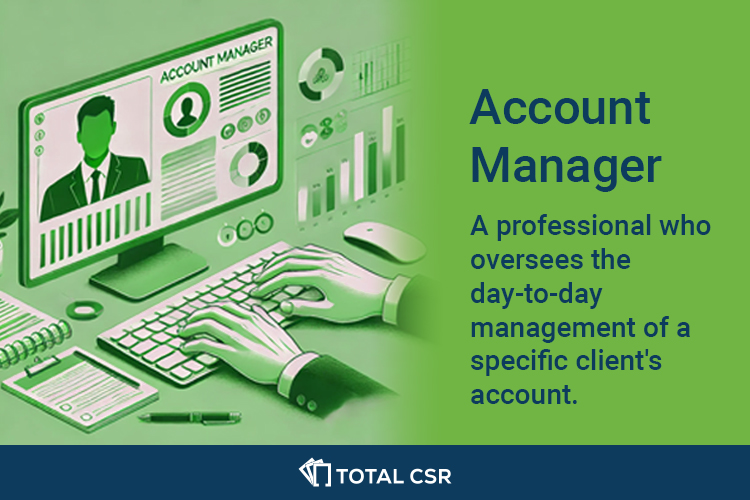Get Started
Follow these simple steps to get started.
- 1
- 2
- 3
Create Account: Step 1 of 3

An insurance account manager, sometimes referred to as a CSR (insurance customer service representative), insurance account coordinator, or insurance relationship manager, plays a crucial role in maintaining strong client relationships and ensuring policyholders receive the service they need. Unlike producers who focus on acquiring new clients, account managers serve as the primary point of contact for existing accounts. They are responsible for policy servicing, client retention, and problem resolution, making them indispensable in both personal and commercial lines of insurance.
In their role as account managers, they work closely with producers, underwriters, and clients to address coverage concerns and identify opportunities for additional protection. In a commercial insurance setting, account managers handle complex policies and provide tailored risk management solutions, often collaborating with insurance risk managers.
Insurance account managers, also referred to as insurance client managers, maintain direct communication with clients, responding to inquiries, processing policy changes, and addressing coverage concerns. Their ability to build and maintain trust significantly impacts client retention. Effective customer relationship management and relationship building are essential for success in this role.
Managing renewals is a key duty. Account managers, whether in personal or commercial lines, proactively review policies to ensure they still meet clients’ needs. This may involve analyzing policy options, recommending adjustments, and negotiating terms with carriers to secure competitive rates. Personal lines account managers focus on individual clients, while commercial account managers may develop territory business plans for their corporate clients.
Beyond administrative tasks, insurance account managers help clients understand their coverage, ensuring they are adequately protected. They analyze exposures, explain policy details, and suggest additional coverages when needed. This role often overlaps with that of an insurance risk manager, especially when dealing with complex commercial accounts.
When clients face a loss, account managers are on the front lines helping. They guide clients through the claims process, ensuring they understand the next steps and assist in communication with adjusters. Some agencies may have specialized insurance claims teams to handle this aspect of client service.
While producers focus on new sales, account managers identify gaps in coverage within existing accounts. By offering additional products through solution selling, they improve client protection and increase agency revenue. This approach to managing customer accounts contributes to the agency’s business development efforts. Insurance sales account managers may specialize in this aspect, focusing on improving sales performance through their selling experience.
Maintaining accurate records is critical. Account managers update client files, process endorsements, and ensure all transactions comply with industry regulations.
With advancements in digital tools and agency management software, many insurance account managers now work remotely. They use cloud-based platforms to handle policy renewals, service accounts, and communicate with clients via phone, email, and video conferencing. Remote roles provide flexibility and access to a broader talent pool, making them an attractive option for both agencies and professionals seeking work-life balance.
Insurance professionals can apply these insights in various situations:
Insurance account managers typically start as insurance customer service representatives (CSRs) or assistants before advancing into account management roles. With experience, they can progress to senior account manager, insurance account supervisor, or agency operations manager positions. Some account managers transition into sales, underwriting, or risk management roles, leveraging their expertise in client service and policy analysis.
Though similar, these two roles have distinct responsibilities:
Salaries for commercial insurance account managers vary based on experience, location, and company size. The base pay range typically falls within these averages:
Highly experienced commercial account managers in large brokerages or specialized industries (e.g., construction, healthcare, or cyber insurance) may earn six figures. Corporate & specialty account managers or those working on strategic account teams may command higher salaries due to the complexity of their accounts.
Earning professional designations can enhance credibility and career prospects. Common certifications include:
This article has outlined the main differences between occurrence and claims-made forms, including key aspects like policy period considerations and the importance of continuous coverage. Insurance professionals can use these insights to better assess coverage options, tailor risk management strategies, and advise clients with confidence. For further guidance or to review your current strategies, please contact our team for a detailed discussion on how understanding the difference between an occurrence vs claims made form can work for your organization. Whether you’re an insurance buyer looking for the right policy or an insurance broker seeking to provide the best advice, we’re here to help navigate the complexities of occurrence insurance and claims-made policies.
Job Summary: We are seeking a detail-oriented and customer-focused Insurance Account Manager to manage and service client accounts effectively. The ideal candidate will have strong insurance knowledge, excellent communication skills, and the ability to handle policy servicing, renewals, claims support, and coverage recommendations
Key Responsibilities:
Qualifications:
Work Environment: This role involves direct client interaction via phone, email, and in-person meetings. It may also require collaboration with producers, underwriters, and claims representatives to ensure optimal client service.
The role of an insurance account manager is pivotal in delivering excellent client service, maintaining policy accuracy, and contributing to agency success. With opportunities in remote work, career advancement into executive roles, and growing salary potential in commercial lines, this profession offers a rewarding path for insurance professionals. As agencies continue adapting to industry changes, skilled account managers, including insurance broker account managers and those specializing in niche areas, will remain in high demand, ensuring policyholders receive expert guidance and support.
Follow these simple steps to get started.
Create Account: Step 1 of 3
Loading...